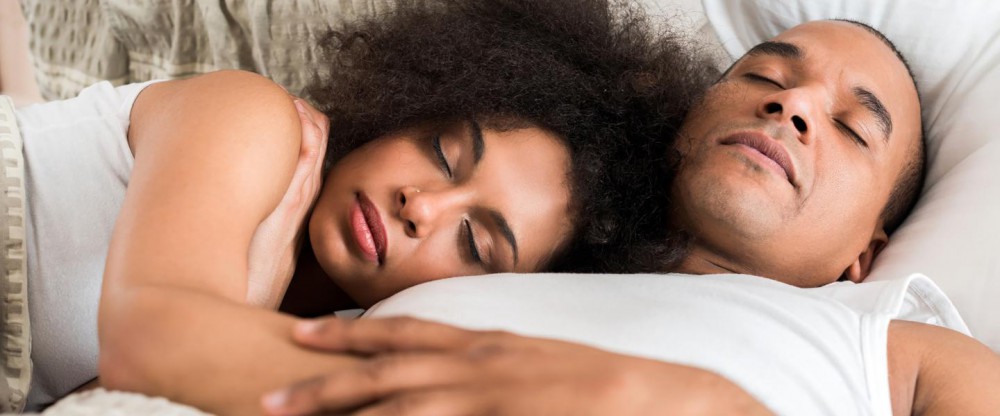Partners and Sleep

What should you do if you suspect your partner has a sleep disorder?
If someone comes into my office and tells me that they suspect their partner has a sleep disorder, the first thing I do is ask when they first noticed the partner's sleep symptoms. I like to know if the partner has shown symptoms for a long time or if the person is only noticing the issue now. Why? Because sometimes I find that people who realize their partner has a sleep disorder after years of living together could be dealing with sleep issues of his or her own.
Take for an example, a married couple with a husband who snores. If the wife goes through a bout of insomnia – she may suddenly take notice of the snoring because she can't sleep.
Usually, bed partners get into a comfortable routine – they may even get used to sleeping with a snoring partner. Each partner has to take into consideration if there has been a change in the norm. If you’ve been together for years and all the sudden you have a problem – it may be treated differently from a new couple that has never been able to adjust to a sleep issue.
Out of respect, if the problem is causing your partner to sleep in another room or get injured (bed partners who kick or move a lot when sleeping) – you should see a sleep doctor. Snoring shouldn't be ignored – especially if it is loud with frequent pauses in breathing.
What are some methods for coping with a snoring partner?
There are some couples that choose to have separate bedrooms. It works for some people, happily. They may go to one bedroom to watch TV, read or have sex and then go to sleep in their respective bedrooms.
You could also try to train a person to sleep on their side or stomach, which may help prevent snoring. You can prop pillows in a position so the snorer is on his or her side or stomach and can't flip onto their back (the position which shoring is most likely to occur). You can nudge them to turn over, but if that doesn't work, it may be a sign that your partner has obstructive sleep apnea (a problem that should be evaluated by a sleep specialist). Avoid alcohol and eating late at night because it exacerbates snoring. If you think it is a nasal issue, see an ear nose and throat specialist. The bed partner can also try earplugs or various white noise machines.
Is there anything you can do to make your partner stop snoring?
If you've found that your partner snores on his or her back, but not on his or her stomach or side, the snoring is side dependant. You can help the snorer learn to sleep in a different position. I have found this technique successful: Have the snorer wear a snug t-shirt with a pocket sewn onto the area mid way between the shoulder blades on the back. Put a tennis ball in this pocket and say goodnight. Whenever the snorer flips onto his or her back, they will find this very uncomfortable, as the tennis ball will cue them to roll back over. Eventually, some people can train themselves to stop sleeping on their back.
What are some methods for coping with a partner's CPAP machine?
Some people are so happy to no longer be sleeping next to a loud snorer that they are happy to sleep next to a "humming" CPAP machine. But there are others who are bothered by the sound. For those, there are some suggestions: You can call the company who set up your CPAP and request a longer cord, so that you can keep the machine in a closet or in another remote area. I have even had patients create soundproof boxes for their CPAP unit. The good news is that machines are smaller and quieter than they used to be.
The partner without the CPAP machine could go to sleep before the patient with the CPAP in hopes that they won't hear it once they've fallen asleep. For added benefit, the partner could sleep with earplugs so they don't hear the sound of the CPAP machine when their partner turns it on.
How can you get your partner to comply?
Many of my patients who are diagnosed with sleep apnea are motivated to use their CPAP machine. If a patient is not convinced or comfortable, I try to identify why they are not complying. Is it because it is uncomfortable? Is it the noise? Is it the mask? Do they need a humidified system? There are solutions to all these issues, once you've zeroed in on the nature of the problem. Go to the sleep lab tech and work out why the patient or the partner doesn't like the machine. Resolving this problem is a key to successful compliance. There are serious ramifications to non-compliance and there are people who are happy to help you make the CPAP more comfortable.
Do you recommend sleeping in separate bedrooms?
This could be one solution, but this is very personal. It is not the first choice for most couples, but could be considered for the short term. Sometimes, couples are content with this solution. Each couple needs to look at the big picture and the overall priority: the health of their partner and a good night's sleep for all. You have to do what works for you.
--Suzan E. Jaffe, Ph.D. is a Board Certified Doctor of Sleep Medicine, Certified in Behavioral Sleep Medicine and an Advanced Registered Psychiatric Nurse Practitioner. She maintains a private practice in Aventura, Florida where she specializes in behavioral sleep medicine, treating children and adults of all ages. Her first book, For the Grieving Child: An Activities Manual can be reviewed on www.marketingnewauthors.com
This article originally appeared in the Spring 2005 issue of sleepmatters.
Learn more about how these medical devices can make a big difference in nighttime comfort for people with breathing issues.A frequent need to get up and go to the bathroom to urinate at night is called nocturia. It differs from enuresis, or bedwetting , in which the person does not arouse from sleep, but the bladder empties anyway. Nocturia is a common cause of sleep loss, especially among older adults. Most people without nocturia can sleep for 6 to...Nearly one-quarter of all workers have shifts that are not during the daytime, and more than two-thirds of these workers...Have you ever wanted to know what happens to your body during menstruation? The latest infographic from the National Sleep...The Electronics and Sleep infographic highlights how technology affects the modern family and how parents can help design a sleep...Orexin receptor antagonists: A new class of sleeping pill Find out more about orexin, and a new type of sleep...You don't have to struggle with sleepless nights. Help is available! There are treatment options for insomnia, ranging from behavioral...The term “anti-aging” may conjure up images of expensive wrinkle creams and nutritional supplements, but one of the most impactful...Though it may come as no surprise that people find it harder to fall asleep when they’re emotionally wound up,...Sleep problems like insomnia can be caused by many different factors, including chronic pain, acid reflux, and depression. But did...

Source: Internet





